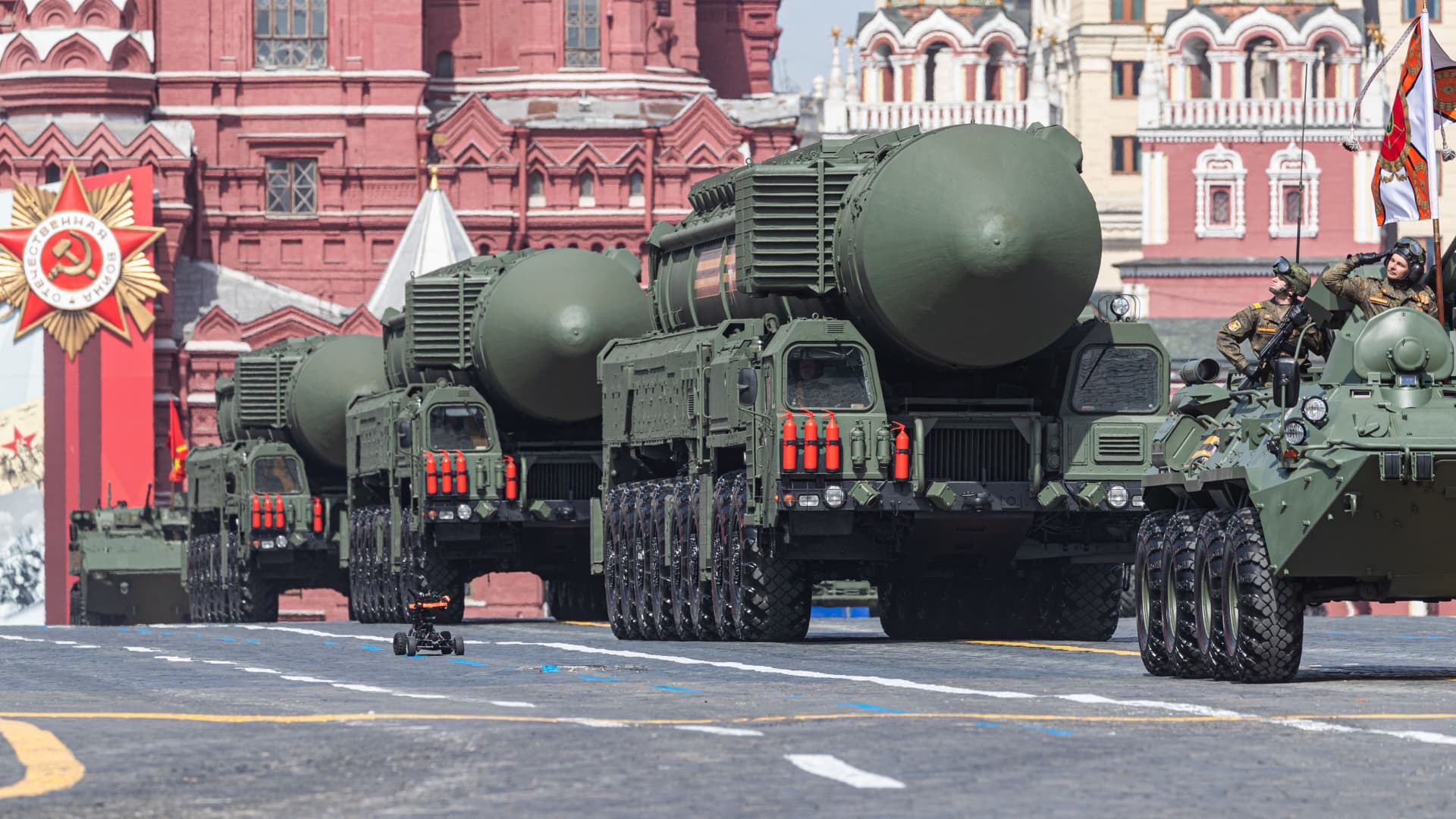President Biden is sending billions of dollars to back Israel’s war against Hamas, even as the destruction of Gaza and deaths of Palestinians fuels growing protest on college campuses.
The $26 billion in new aid to Israel, passed overwhelmingly in Congress and signed into law by Biden this week, also comes amid a deepening humanitarian crisis in Gaza and a looming Israeli invasion of the southern city of Rafah, where more than a million Palestinian civilians are sheltering.
While Democrats have expressed growing concerns about how Israel is carrying out its war in Gaza, they largely rallied around sending more weapons when the bill moved through the House and Senate in the past week.
Khaled Elgindy, a senior fellow at the Middle East Institute, said weapons to Israel remains “sacrosanct” in Washington, and the latest package was helped by a rallying around Israel after Iran’s April 13 barrage of some 300 missiles and drones toward the nation.
But Elgindy said the aid package highlights a “huge gap” between Democrats in Congress and rank-and-file voters, including those currently protesting at colleges nationwide.
“Eventually that gap will have to narrow unless the party wants to remain permanently at odds with its voters, which I can’t imagine they want to do,” he said. “Public opinion has shifted very, very dramatically, especially among the left and among people who identify as Democrats.”
“The overarching trends in this case are the Democrats are moving gradually more and more toward aid conditionality,“ he added, “even if this particular vote doesn’t reflect that.”
The debate comes as college campuses across the U.S. are roiled by pro-Palestinian students rallying against the war in Gaza and calling for universities to divest from Israeli companies or defense companies supplying weapons to Israel.
But Julie Rayman, managing director of policy and political affairs at the American Jewish Committee, said the protests are “emotionally driven” and problematic because some have chanted to free Palestine “from the river to the sea,” which can be interpreted as a call to eliminate Israel as a state.
She said there is a disconnect between what some of these students are chanting for and what lawmakers in Congress are calling for, such as alleviating suffering in Gaza.
“What we’re seeing now [on] college campuses is, frankly, and I think indisputably, not productive,” she said. “I don’t worry necessarily that these protests are massive signals on how society is viewing this” war.
Rayman sees support for Israel as “overwhelmingly” strong in Washington, a consensus she says must be maintained.
“There’s all sorts of issues that need to be considered” on U.S. engagement with Israel and how it prioritizes humanitarian aid, she said. “But none of that can come at the expense of ensuring the defense of our most strategic ally.”
The $26 billion package is almost entirely earmarked for defensive and offensive weapons for Israel, with some funds for U.S. forces in the Middle East.
Critics of prevailing U.S. policy toward Israel have urged Biden to use Israel’s desire for U.S. weapons as leverage to lessen the suffering in Gaza, where more than 34,000 Palestinians have died in nearly seven months of war.
The war is in retaliation for the Hamas invasion of southern Israel on Oct. 7, when militant fighters killed more than 1,100 people and kidnapped another roughly 250. Somewhere around 100 hostages are believed to still be alive in Gaza, and ongoing negotiations to release them in exchange for a cease-fire have so far failed.
While Biden has pushed for a hostage release and temporary cease-fire deal and has expressed frustration with the humanitarian crisis in Gaza, he has continued to unconditionally send more weapons to Israel, which is committed to fighting until Hamas is destroyed. That aim has placed a target on Rafah, a final Hamas holdout. The U.S. has said it won’t back an invasion of the city unless there is a safe civilian evacuation plan, but Israel has vowed to press ahead regardless of outside pressure.
“My commitment to Israel, I want to make clear again, is ironclad,” Biden said after signing the $95 billion national security supplemental into law on Wednesday, which also includes aid for Ukraine and the Indo-Pacific.
“The security of Israel is critical. I will always make sure that Israel has what it needs to defend itself against Iran and terrorists it supports.”
Biden also underlined how the bill contains $1 billion in humanitarian aid for Gaza, where the U.S. military is airdropping in food and water and nearing the finish line on construction of a port off the coast of the territory to get more assistance in. That effort comes as Israel faces accusations it is still restricting aid trucks through land crossings.
Trita Parsi, the executive vice president of the Quincy Institute for Responsible Statecraft, said Biden maintains a disconnect between what he is saying and how he is acting, with the president expressing concern about Israel’s actions in Gaza but still greenlighting new weapons.
“The picture is actually quite clear: what Biden is doing is increasing his rhetorical criticism of Israel and when it comes to practical policy, all of the movement is towards continuing to support what Biden himself criticizes,” he said.
Supporters of Israel say the passage of the U.S. aid by the White House and Congress signals relatively steady support to ensure the Israeli people are safe against Iran, Hamas and other regional threats.
Yaakov Lappin, a military and strategic affairs analyst at the MirYam Institute, an Israeli-led forum, said the aid package was a “critical development for Israel security,” even if the White House is sounding a more critical note at times.
“The White House has got very stringent conditions for its support,” he said, but “the congressional support for Israel remains very strong on the whole, and we saw that just now with the votes.”
On Capitol Hill, Democrats willing to oppose aid for Israel remain a small minority, even as concern about the humanitarian crisis mounts. In the House, which voted on separate aid packages for each nation, the final tally was 366-58, with only 37 Democrats against.
“Our votes against [Israel aid] are votes against supplying more offensive weapons that could result in more killings of civilians in Rafah and elsewhere,” said a joint statement from 19 Democrats who voted against the package.
“When faced with the question of whether to provide offensive aid to further this conflict, we believe there is a moral imperative to find another path.”
A growing number of Democrats have called to condition weapons to Israel after an Israeli strike killed seven aid workers with the charity World Central Kitchen, which Israel attributed to a mistake but still led to severe backlash in Washington.
Some of those critical Democratic lawmakers voted for the package last weekend.
Among them was Rep. Sara Jacobs (D-Calif.), who said she still wants to restrict offensive weapons to Israel but supported the aid package because it contained humanitarian assistance for Gaza and other conflict-stricken places.
“While I’m deeply concerned about further military assistance to Israel, I couldn’t in good conscience vote against this lifesaving humanitarian assistance when millions of people around the world are suffering,” Jacobs said in a statement after the vote.
In the Senate, only a small group of Democrats are actively calling to condition aid to Israel, including Sen. Bernie Sanders (I-Vt.), who tried and failed to pass an amendment to the bill that would restrict offensive military assistance.
“That amendment could not even get a vote,” Sanders said on the floor this week. “We can’t even discuss the issue.”
However, college students are forcing the issue, with growing protest encampments and pressure on university leadership.
Republican House leaders were jeered during a press conference this week at Columbia University, where the wave of demonstrations started. Some universities have cracked down on the protesters and arrested dozens of them.
Biden has also condemned the student protesters as “antisemitic.”
“This has been a massive disaster for Biden,” said Parsi from the Quincy Institute, referring to the college campus protests. “This is a key voting group.”
Parsi added the protests could lead to more pressure on Democrats to act on Gaza, as they are bringing a “new level of energy” and a “completely new level of skepticism” on U.S. policy toward Israel.
Copyright 2024 Nexstar Media Inc. All rights reserved. This material may not be published, broadcast, rewritten, or redistributed.







